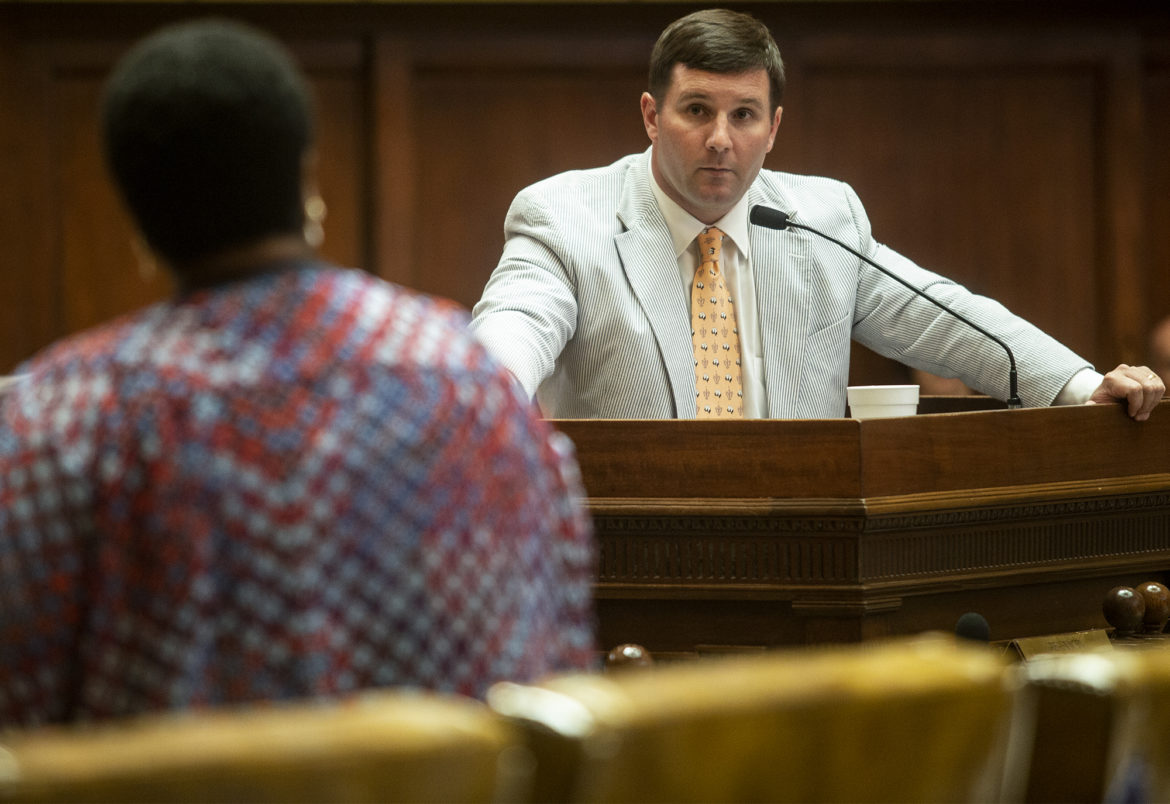Mississippi Today
‘Only in Mississippi’: White representatives vote to create white-appointed court system for Blackest city in America
‘Only in Mississippi’: White representatives vote to create white-appointed court system for Blackest city in America
A white supermajority of the Mississippi House voted after an intense, four-plus hour debate to create a separate court system and an expanded police force within the city of Jackson — the Blackest city in America — that would be appointed completely by white state officials.
If House Bill 1020 becomes law later this session, the white chief justice of the Mississippi Supreme Court would appoint two judges to oversee a new district within the city — one that includes all of the city’s majority-white neighborhoods, among other areas. The white state attorney general would appoint four prosecutors, a court clerk, and four public defenders for the new district. The white state public safety commissioner would oversee an expanded Capitol Police force, run currently by a white chief.
The appointments by state officials would occur in lieu of judges and prosecutors being elected by the local residents of Jackson and Hinds County — as is the case in every other municipality and county in the state.
Mississippi’s capital city is 80% Black and home to a higher percentage of Black residents than any major American city. Mississippi’s Legislature is thoroughly controlled by white Republicans, who have redrawn districts over the past 30 years to ensure they can pass any bill without a single Democratic vote. Every legislative Republican is white, and most Democrats are Black.
After thorough and passionate dissent from Black members of the House, the bill passed 76-38 Tuesday primarily along party lines. Two Black member of the House — Rep. Cedric Burnett, a Democrat from Tunica, and Angela Cockerham, an independent from Magnolia — voted for the measure. All but one lawmaker representing the city of Jackson — Rep. Shanda Yates, a white independent — opposed the bill.
“Only in Mississippi would we have a bill like this … where we say solving the problem requires removing the vote from Black people,” Rep. Ed Blackmon, a Democrat from Canton, said while pleading with his colleagues to oppose the measure.
READ MORE: Hinds County forces unite against bill to create unelected judicial district, expanded police force
For most of the debate, Jackson Mayor Chokwe Antar Lumumba — who has been publicly chided by the white Republicans who lead the Legislature —looked down on the House chamber from the gallery. Lumumba accused the Legislature earlier this year of practicing “plantation politics” in terms of its treatment of Jackson, and of the bill that passed Tuesday, he said: “It reminds me of apartheid.”
Hinds County Circuit Judge Adrienne Wooten, who served in the House before being elected judge and would be one of the existing judges to lose jurisdiction under this House proposal, also watched the debate.
Public Safety Commissioner Sean Tindell, who oversees the Capitol Police, watched a portion of the debate from the House gallery, chuckling at times when Democrats made impassioned points about the bill. Lt. Gov. Delbert Hosemann, the only statewide elected official who owns a house in Jackson, walked onto the House floor shortly before the final vote.
Rep. Blackmon, a civil rights leader who has a decades-long history of championing voting issues, equated the current legislation to the Jim Crow-era 1890 Constitution that was written to strip voting rights from Black Mississippians.
“This is just like the 1890 Constitution all over again,” Blackmon said from the floor. “We are doing exactly what they said they were doing back then: ‘Helping those people because they can’t govern themselves.'”
The bill was authored by Rep. Trey Lamar, a Republican whose hometown of Senatobia is 172 miles north of Jackson. It was sent to Lamar’s committee by Speaker Philip Gunn instead of a House Judiciary Committee, where similar legislation normally would be heard.
“This bill is designed to make our capital city of Jackson, Mississippi, a safer place,” Lamar said, citing numerous news sources who have covered Jackson’s high crime rates. Dwelling on a long backlog of Hinds County court cases, Lamar said the bill was designed to “help not hinder the (Hinds County) court system.”
“My constituents want to feel safe when they come here,” Lamar said, adding the capital city belonged to all the citizens of the state. “Where I am coming from with this bill is to help the citizens of Jackson and Hinds County.”
Many House members who represent Jackson on Tuesday said they were never consulted by House leadership about the bill. Several times during the debate, they pointed out that Republican leaders have never proposed increasing the number of elected judges to address a backlog of cases or increasing state funding to assist an overloaded Jackson Police Department.
In earlier sessions, the Legislature created the Capitol Complex Improvement District, which covers much of the downtown, including the state government office complex and other areas of Jackson. The bill would extend the existing district south to Highway 80, north to County Line Road, west to State Street and east to the Pearl River. Between 40,000 and 50,000 people live within the area.
Opponents of the legislation, dozens of whom have protested at the Capitol several days this year, accused the authors of carving out mostly white, affluent areas of the city to be put in the new district.
The bill would double the funding for the district to $20 million in order to increase the size of the existing Capitol Police force, which has received broad criticism from Jacksonians for shooting several people in recent months with little accountability.
The new court system laid out in House Bill 1020 is estimated to cost $1.6 million annually.
Democratic members of the House said if they wanted to help with the crime problem, the Legislature could increase the number of elected judges in Hinds County. Blackmon said Hinds County was provided four judges in 1992 when a major redistricting occurred, and that number has not increased since then even as the caseload for the four judges has exploded.
In addition, Blackmon said the number of assistant prosecuting attorneys could be increased within Hinds County. In Lamar’s bill, the prosecuting of cases within the district would be conducted by attorneys in the office of Attorney General Lynn Fitch, who is white.
Blackmon said the bill was “about a land grab,” not about fighting crime. He said other municipalities in the state had higher crime rates than Jackson. Blackmon asked why the bill would give the appointed judges the authority to hear civil cases that had nothing to do with crime.
“When Jackson becomes the No. 1 place for murder, we have a problem,” Lamar responded, highlighting the city’s long backlog of court cases. Several Democrats, during the debate, pointed out that the state of Mississippi’s crime lab has a lengthy backlog, as well, adding to the difficult in closing cases in Hinds County.
Lamar said the Mississippi Constitution gives the Legislature the authority to create “inferior courts,” as the Capitol Complex system would be. The decisions of the appointed judges can be appealed to Hinds County Circuit Court.
Democrats offered seven amendments, including one to make the judges elected. All were defeated primarily along partisan and racial lines.
“We not incompetent,” said Rep. Chris Bell, D-Jackson. “Our judges are not incompetent.”
An amendment offered by Rep. Cheikh Taylor, D-Starkville, to require the Capitol Police to wear body cameras was approved. Lamar voiced support for the amendment.
Much of the debate centered around the issue of creating a court where the Black majority in Hinds County would not be allowed to vote on judges.
One amendment that was defeated would require the appointed judges to come from Hinds County. Lamar said by allowing the judges to come from areas other than Hinds County would ensure “the best and brightest” could serve. Black legislators said the comment implied that he judges and other court staff could not be found within the Black majority population of Hinds County.
When asked why he could not add more elected judges to Hinds County rather than appointing judges to the new district, Lamar said, “This is the bill that is before the body.”
This article first appeared on Mississippi Today and is republished here under a Creative Commons license.
Mississippi Today
Brain drain: Mother understands her daughters’ decisions to leave Mississippi
Editor’s note: This Mississippi Today Ideas essay is published as part of our Brain Drain project, which seeks answers to Mississippi’s brain drain problem. To read more about the project, click here.
Back when I was a kid in 1988, my mama and I had an argument about what I wanted to major in at college.
I had dreamed of being a journalist since the age of 8. To me, that meant that I was going to Ole Miss, which had the journalism department.
My mama said I could only go away from home to Ole Miss if I was going to major in law.
So I settled on going to Mississippi State University just down the road and majoring in communication. She told me I should major in engineering since that’s what State was known for.
I said, “That’s even dumber than me going to law school. I hate math.”
“Well, you could at least try,” she said.
I said no. Then she told me I was wasting my education and turned her back on me.
I get it. She knew and I knew that I couldn’t stay in Choctaw County where I was raised and earn a living with that degree. I would have to go somewhere else — probably to the Jackson metro area and work for Gannett or the Associated Press. Or to Memphis. Or Biloxi. Or even New Orleans. She never really forgave me for moving to the Jackson metro, working in my field and raising her grandchildren so far from her.
After a while, I got used to the pace of life around here. I knew I probably wouldn’t ever move anywhere else because I noticed that people who left Mississippi often came back, whether due to family obligations or a realization that “somewhere else” wasn’t quite all it was cracked up to be.
I also noticed that a lot of people played up how they were from Mississippi while making a very good living being someplace else. I decided I wanted to prove you could be from Mississippi, live in Mississippi, work in Mississippi and make something of yourself without leaving Mississippi.
But I noticed something else over the years, too. Most of the kids in Brandon dreamed of going off from home to cities like Atlanta, Nashville, Dallas, DC, New York or Orlando. They didn’t seem to have reasons — just a desire to get away from the state as fast as they could.
Then my three daughters and I started having conversations about what they wanted to major in when they went to college. My oldest wanted to be a chef. My middle one was undecided between chemical engineering and landscape architecture. And my youngest was fascinated with roads and bridges.
I was all too aware of what had happened in the job markets in Mississippi since I had come up. Companies closed operations in a globalized economy and fled to cheaper labor markets. The advent of the internet meant employers could hire from all over the world. Longtime business leaders retired and sold out to big corporations that reduced investments in local communities that had supported those businesses for decades and then complained that those towns didn’t offer enough amenities for their employees to want to relocate there.
But the reality really set in when my chef daughter chose her first internship — in historic Williamsburg, Virginia.
I would never have dreamed of driving that far from home to try out a place to work when I was her age. Then after her senior year, she interned at Walt Disney World and got hired full-time before the internship was over. She was off to live in Orlando where now with her husband and young son she’s creating community and loves going to work every day with a pretty enviable benefits package, too, a thing unheard of in the culinary world in Mississippi.
My middle one finally settled on chemical engineering and was picked for a co-op job in her first semester at age 18 at a company in Georgia. When she graduated four years later, we packed her off to Indiana for a research and development job, and she now lives in New Hampshire with her husband, making six figures a year at 26 years old and looking forward to partaking in the cultural offerings in New York City when she can.
The youngest is currently in college for civil engineering, and I’m bracing myself for the inevitable. She doesn’t want to work for state government, so she’s likely going out of state as well. Her comment about coming back to Jackson metro was the most damning of all. “There’s nothing to do here,” she says.
A lot of people ask me questions: How often do you see your daughters? How can you stand being so far from your grandson? Don’t they at least come home for Christmas?
The answer to all of those questions is that we do the best we can. We text, we message on Facebook, we talk on the phone at least once a week, every Sunday. We arrange visits; sometimes it’s us driving to them while other times they drive to us.
I can’t imagine making my children as miserable as my mom made me over my life choices. We are flexible, understanding, and very, very proud of our daughters, who are grappling with enough in their lives without us loading them down with guilt over when they are coming home.
The calculus may change in the future. We may have declines in health and need to move closer to one of our children if we need assistance. Or we may need to be in assisted living care here in Mississippi where such care may be marginally cheaper than wherever our girls land.
But I don’t wish our girls had settled for life in Mississippi.
What I wish is that Mississippi could find a way to live up to its potential — to be a place more worthy of my daughters’ loyalty, affections and investment in themselves.
Maybe it will be someday. I hope so, for all of our sakes.
Julie Liddell Whitehead lives and writes from Mississippi. An award-winning freelance writer, Julie covered disasters from 9/11 to Hurricane Katrina throughout her career. Her first book is “Hurricane Baby: Stories,” published by Madville Publishing. She writes on mental health, mental health education and mental health advocacy. She has a bachelor’s degree in communication, with a journalism emphasis, and a master’s degree in English, both from Mississippi State University. In 2021, she completed her MFA from Mississippi University for Women.
This article first appeared on Mississippi Today and is republished here under a Creative Commons Attribution-NoDerivatives 4.0 International License.
The post Brain drain: Mother understands her daughters' decisions to leave Mississippi appeared first on mississippitoday.org
Note: The following A.I. based commentary is not part of the original article, reproduced above, but is offered in the hopes that it will promote greater media literacy and critical thinking, by making any potential bias more visible to the reader –Staff Editor.
Political Bias Rating: Center-Left
This essay reflects a Center-Left perspective by focusing on social and economic challenges faced by Mississippi, such as brain drain, job market changes, and community decline. The tone is empathetic and advocates for investment in local opportunities and amenities to retain talent, aligning with progressive concerns about economic inequality and regional development. However, it remains largely personal and reflective rather than explicitly ideological or partisan. The article critiques systemic economic shifts without advancing a polarized political agenda, emphasizing hope for future improvement and a more supportive environment for young professionals.
Mississippi Today
After 30 years in prison, Mississippi woman dies from cancer she says was preventable
Behind Bars, Beyond Care:
A Mississippi Today investigation into suffering, secrecy and the business of prison health care
Susie Balfour, diagnosed with terminal breast cancer two weeks before her release from prison, has died from the disease she alleged past and present prison health care providers failed to catch until it was too late.
The 64-year-old left the Central Mississippi Correctional Facility in December 2021 after more than 30 years of incarceration. She died on Friday, a representative for her family confirmed.
Balfour is survived by family members and friends. News of her passing has led to an outpouring of condolences of support shared online from community members, including some she met in prison.
Instead of getting the chance to rebuild her life, Balfour was released with a death sentence, said Pauline Rogers, executive director of the RECH Foundation.
“Susie didn’t just survive prison, she came out fighting,” Rogers said in a statement. “She spent her final years demanding justice, not just for herself, but for the women still inside. She knew her time was limited, but her courage was limitless.”
Last year, Balfour filed a federal lawsuit against three private medical contractors for the prison system, alleging medical neglect. The lawsuit highlighted how she and other incarcerated women came into contact with raw industrial chemicals during cleaning duty. Some of the chemicals have been linked to an increased risk of cancer in some studies.
The companies contracted to provide health care to prisoners at the facility over the course of Balfour’s sentence — Wexford Health Sources, Centurion Health and VitalCore, the current medical provider — delayed or failed to schedule follow-up cancer screenings for Balfour even though they had been recommended by prison physicians, the lawsuit says.
“I just want everybody to be held accountable,” Balfour said of her lawsuit. “ … and I just want justice for myself and other ladies and men in there who are dealing with the same situation I am dealing with.”
Rep. Becky Currie, who chairs the House Corrections Committee, spoke to Balfour last week, just days before her death. Until the very end, Balfour was focused on ensuring her story would outlive her, that it would drive reforms protecting others from suffering the same fate, Currie said.
“She wanted to talk to me on her deathbed. She could hardly speak, but she wanted to make sure nobody goes through what she went through,” Currie said. “I told her she would be in a better place soon, and I told her I would do my best to make sure nobody else goes through this.”
During Mississippi’s 2025 legislative session, Balfour’s story inspired Rep. Justis Gibbs, a Democrat from Jackson, to introduce legislation requiring state prisons to provide inmates on work assignments with protective gear.
Gibbs said over 10 other Mississippi inmates have come down with cancer or become seriously ill after they were exposed to chemicals while on work assignments. In a statement on Monday, Gibbs said the bill was a critical step toward showing that Mississippi does not tolerate human rights abuses.
“It is sad to hear of multiple incarcerated individuals passing away this summer due to continued exposure of harsh chemicals,” Gibbs said. “We worked very hard last session to get this bill past the finish line. I am appreciative of Speaker Jason White and the House Corrections Committee for understanding how vital this bill is and passing it out of committee. Every one of my house colleagues voted yes. We cannot allow politics between chambers on unrelated matters to stop the passage of good common-sense legislation.”
The bill passed the House in a bipartisan vote before dying in the Senate. Currie told Mississippi Today on Monday that she plans on marshalling the bill through the House again next session.
Currie, a Republican from Brookhaven, said Balfour’s case shows that prison medical contractors don’t have strong enough incentives to offer preventive care or treat illnesses like cancer.
In response to an ongoing Mississippi Today investigation into prison health care and in comments on the House floor, Currie has said prisoners are sometimes denied life saving treatments. A high-ranking former corrections official also came forward and told the news outlet that Mississippi’s prison system is rife with medical neglect and mismanagement.
Mississippi Today also obtained text messages between current and former corrections department officials showing that the same year the state agreed to pay VitalCore $100 million in taxpayer funds to provide healthcare to people incarcerated in Mississippi prisons, a top official at the Department remarked that the company “sucks.”
Balfour was first convicted of murdering a police officer during a robbery in north Mississippi, and she was sentenced to death. The Mississippi Supreme Court reversed the conviction in 1992, finding that her constitutional rights were violated in trial. She reached a plea agreement for a lesser charge, her attorney said.
As of Monday, the lawsuit remains active, according to court records. Late last year Balfour’s attorneys asked for her to be able to give a deposition with the intent of preserving her testimony. She was scheduled to give one in Southaven in March.
Rogers said Balfour’s death is a tragic reminder of systemic failures in the prison system where routine medical care is denied, their labor is exploited and too many who are released die from conditions that went untreated while they were in state custody.
Her legacy is one RECH Foundation will honor by continuing to fight for justice, dignity and systemic reform, said Rogers, who was formerly incarcerated herself.
This article first appeared on Mississippi Today and is republished here under a Creative Commons Attribution-NoDerivatives 4.0 International License.
The post After 30 years in prison, Mississippi woman dies from cancer she says was preventable appeared first on mississippitoday.org
Note: The following A.I. based commentary is not part of the original article, reproduced above, but is offered in the hopes that it will promote greater media literacy and critical thinking, by making any potential bias more visible to the reader –Staff Editor.
Political Bias Rating: Center-Left
This article presents a critical view of the Mississippi prison health care system, highlighting systemic failures and medical neglect that led to the death of a formerly incarcerated woman. The tone and framing focus on social justice issues, prisoner rights, and the need for government accountability and reform, which align with Center-Left values emphasizing government responsibility for vulnerable populations. While the article is largely investigative and fact-based, its emphasis on advocacy for reform, criticism of privatized prison health contractors, and highlighting bipartisan legislative efforts suggest a Center-Left leaning perspective rather than neutral reporting.
Mississippi Today
FBI concocted a bribery scheme that wasn’t, ex-interim Hinds sheriff says in appeal
Former interim Hinds County sheriff Marshand Crisler is appealing bribery and ammunition charges stemming from his 2021 campaign, arguing that the federal government played on his relationship with a former supporter to entrap him.
Crisler had asked Tonarri Moore, who donated to past campaigns, for a financial contribution for the sheriff’s race. Moore said he would donate if Crisler helped with several requests. Without the previous relationship, Crisler would not have acted, his attorney argues, and Crisler had no reason to believe he was being bribed.
“The government, having concocted a bribery scheme to entrap Crisler, then had to contrive a corresponding quid pro quo to support the scenario with which to entrap him,” attorney John Holliman wrote in a Saturday appellant brief.
Crisler is asking the U.S. 5th Circuit Court of Appeals to reverse his conviction and render its own rulings on both counts.
He was convicted in federal court in November after a three-day trial and sentenced earlier this year to 2 ½ years in prison. Crisler is serving time in FCI Beckley in West Virginia.
The day before Crisler reached out to Moore to ask for support for his campaign for sheriff, Drug and Enforcement Administration agents raided Moore’s home and found guns and drugs. An FBI agent called to the scene looked through Moore’s phone and saw Crisler had called.
According to the appellant brief, the agent asked Moore what Crisler would do if offered money, and if Moore was bribing him. Moore said he wasn’t bribing Crisler, and the agent asked if Moore would do it.
At that time, there weren’t reasonable grounds to start a bribery investigation into Crisler, his attorney argues, nor was there reason to believe he was seeking a bribe.
Moore agreed to become an informant for the FBI, in exchange for the government not prosecuting him for the guns and drugs.
The FBI fitted him with a wire to record Crisler during meetings, which began that day. The meetings included one inside Moore’s night club and a cigarette lounge in Jackson. Agents provided Moore with the $9,500 he gave to Crisler between September and November 2021.
Crisler’s 2023 indictment came as he campaigned again for sheriff and months before the primary election. He remained in the race and lost to the incumbent who he faced in 2021.
At trial, the government argued the exchange of money were attempts to bribe because Moore made several requests of Crisler: to move his cousin to a different part of the Hinds County Detention Center, to get him a job in the sheriff’s office and for Crisler to let Moore know if law enforcement was looking into his activities.
In closing arguments, Assistant U.S. Attorney Charles Kirkham pointed to examples of quid pro quo in recordings, including one where Moore said to Crisler, “You scratch my back, I scratch yours” and Crisler replied “Hello!” in a tone that the government saw as agreement.
The appellant’s brief argues that without Moore’s requests, the government lacked a way to show quid pro quo, a requirement of bribery charge: that Crisler committed or agreed to commit an official act in exchange for funds.
Moore also asked Crisler to give him bullets despite being a convicted felon, which is prohibited under federal law. The brief notes how the government directed Moore to come up with a story for needing the bullets and to ask Crisler to give them to him.
In response, Crisler told Moore he could buy bullets at several sporting goods stores. Moore said they ran out, and eventually Crisler gave him bullets.
Crisler also argues that the government prosecuted routine political behavior. Specifically, accepting campaign donations is not illegal, and can not constitute bribery unless there is an explicit promise to perform or not perform an official act in exchange for money.
“Our political system relies on interactions between citizens and politicians with requests being made for this or that which is within the power of the elected official to do,” the brief states. “This does not constitute a bribery scheme. It is the normal working of our political system.”
This article first appeared on Mississippi Today and is republished here under a Creative Commons Attribution-NoDerivatives 4.0 International License.
The post FBI concocted a bribery scheme that wasn’t, ex-interim Hinds sheriff says in appeal appeared first on mississippitoday.org
Note: The following A.I. based commentary is not part of the original article, reproduced above, but is offered in the hopes that it will promote greater media literacy and critical thinking, by making any potential bias more visible to the reader –Staff Editor.
Political Bias Rating: Center-Right
The article presents the legal appeal of former interim Hinds County sheriff Marshand Crisler with a focus on his argument that the FBI orchestrated an entrapment scheme. The language is largely factual and centers on the defense’s claims and legal standards for bribery, emphasizing normal political behavior versus illegal conduct. While the article reports on the government’s position, it gives significant space to Crisler’s defense and critiques of federal prosecution tactics. This framing, highlighting skepticism toward federal law enforcement and emphasizing the defense perspective, suggests a slight center-right leaning, reflecting a cautious stance on government overreach without overt ideological language.
-
Mississippi Today5 days ago
After 30 years in prison, Mississippi woman dies from cancer she says was preventable
-
News from the South - Georgia News Feed6 days ago
Woman charged after boy in state’s custody dies in hot car
-
News from the South - Florida News Feed5 days ago
Warning for social media shoppers after $22K RV scam
-
News from the South - Texas News Feed7 days ago
Texas VFW holds memorial service for WWII pilot from Georgetown
-
News from the South - North Carolina News Feed3 days ago
Two people unaccounted for in Spring Lake after flash flooding
-
News from the South - Georgia News Feed5 days ago
Georgia lawmakers to return this winter to Capitol chambers refreshed with 19th Century details
-
News from the South - Missouri News Feed7 days ago
Missouri native Chad Marler takes title, wins $100K at major bass tournament
-
News from the South - Alabama News Feed7 days ago
Flood Watch for Alabama: Storms linger overnight, with cooler weather in the forecast



















































